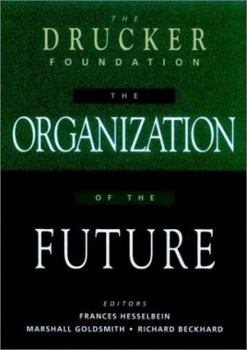The Organization of the Future
Select Format
Select Condition 
Book Overview
Join the best minds on business as they envision the future The Drucker Foundation This much anticipated second title in the Drucker Foundation Future Series imagines tomorrow's organization. Bringing together such heavy hitters as James Champy, C.K. Prahalad, Charles Handy, Lewis Platt (CEO of Hewlett Packard), and Jay Galbraith, this second volume in the Drucker Foundation Future Series is poised to be the business book of the year. In these 40 new, never-before-published essays, best-selling authors, top-notch consultants, Fortune 500 CEO's, and revered management scholars expound on the challenges we face in building the organization of tomorrow. Fresh perspectives and challenging observations will enlighten business people from all industries on how to keep their organizations healthy and competitive well into the 21st century. Supported by two giants--Peter Drucker opens the book, and Charles Handy closes it--the authors within provide their own perspectives on tomorrow, in thoughtful, to-the-point chapters. Together they underscore where, when, and how organizations and their leaders must evolve, not only to survive but also to prosper. The contributors show how to: * prepare for breakdowns and create the nimble, change-adept company * navigate generational riptides among employees by meeting their preferences in leadership style * attract, motivate, and retain the best employees * achieve a winning culture of high performance and high self-esteem * support work-life balance and provide flexibility to knowledge workers Today's and tomorrow's leaders everywhere will find practical advice in these essays to help them reshape their own organizations of the future.
Format:Hardcover
Language:English
ISBN:0787903035
ISBN13:9780787903039
Release Date:December 1996
Publisher:Jossey-Bass
Length:399 Pages
Weight:1.50 lbs.
Dimensions:9.6" x 1.3" x 6.4"
Customer Reviews
5 ratings
Outstanding views for today and tomorrow.
Published by Thriftbooks.com User , 24 years ago
'The Organization of the Future' is an outstanding integration of much of the current thinking of leadership, organization, strategy, change, and innovation. Frances Hesselbein, Marshall Goldsmith, and Richard Beckhard (editors) have gathered together in this collection remarkable 49 thought thinkers.Charles Handy suggests in his chapter that "Margaret Wheatley, in 'Leadership and the New Science,' has written of the danger of believing in Newtonian organization in a quantum age. Newton wasn't wrong. He just wasn't right enough to cope with the dilemmas of science now. Similarly, the old way of looking at organizations wasn't wrong; it just does not capture the real essence of what it means to organize today." On the other hand, Peter F.Drucker notes in his introduction, "...now a totaly different approach is emerging, not replacing the older approaches but being superimposed on them: it says that the purpose of organizations is to get results 'outside,' that is, to achieve performance in the market. The organization is, however, more than a machine...It is more than economic, defined by results in the marketplace. The organization is, above all, 'social.' It is people. Its purpose must therefore be to make the strengths of people effective and their weaknesses irrelevant."In this context, the editors divide this book into six parts. They write in their preface, "throughout the chapters in this book, the need for organizations is unquestioned. The authors provide a variety of forms and operating plans for organizations today and tomorrow; at the same time, each recognizes the indispensable role of organizations to human accomplishment and achievement."Highly recommended.
!
Published by Thriftbooks.com User , 25 years ago
I am using this book for courses in a degree in leadership. This book is a definite plus! It is a compolation of 28 essays from different scholars and executives and is must read for MBA students and business leaders alike.
GREAT OPTIONS FOR CREATING ORGANIZATIONS THAT ACHIEVE MORE
Published by Thriftbooks.com User , 26 years ago
THE ORGANIZATION OF THE FUTURE is the best compilation of essays that I have seen on different ways to organize businesses and nonprofits to achieve different kinds of results. The book is full of intriguing questions and choices, and lots of good ideas about how to make the desired changes you select. Anyone who manages people should read this book, and refer to it when effectiveness questions arise. The only thing that seemed to be missing from this book was a "clean slate" approach to organizations, by imagining what has never existed before. That would be an intriguing addition for future editions. The Drucker Foundation has done a real service to us all by creating its series (THE LEADER ..., THE ORGANIZATION ..., and THE COMMUNITY OF THE FUTURE). I hope that a future version will appear on THE MANAGEMENT PROCESSES OF THE FUTURE. That would be an invaluble complement to this outstanding series.
Easy, strong and very useful
Published by Thriftbooks.com User , 26 years ago
I believe that this book is the kind of book that any manager of the actual era must to read. This is the right way to change the current paradigms about the management at ending 90's.I love the format that include many articles from differents authors, is very usefull to contrast any point of view with another.I recommend it for any student of MBA.
The message is clear. Organizations must be flexible
Published by Thriftbooks.com User , 27 years ago
The backgrounds of the forty-six authors provides a look at the problems facing organizational growth from many different views. I enjoy the short and complete chapters.





